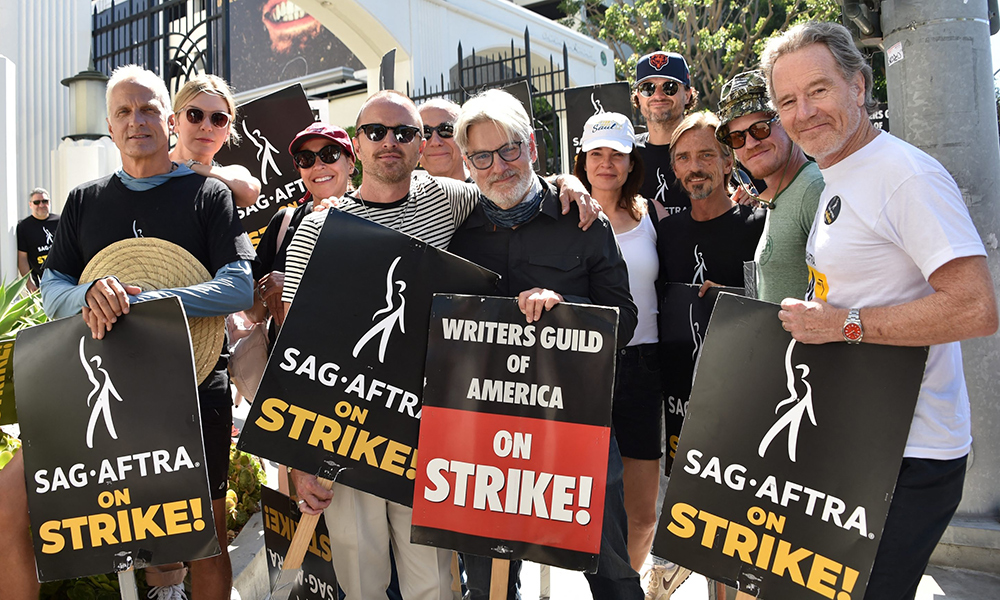
持續四個月的好萊塢罷工讓電影公司與劇作家和演員走上了對立面,而且在短期之內無法平息。與此同時,經濟卻正在承擔其后果。
美國勞工統計局(Bureau of Labor Statistics)的數據顯示,今年8月,涵蓋電影、電視和音樂業務的好萊塢娛樂行業所提供的工作崗位數較7月減少了1.7萬個。這一現象凸顯了罷工的廣泛影響,而罷工基本上讓電影公司的拍攝處于停滯狀態,不僅僅是罷工員工本身,同時還有支持好萊塢這臺機器的聲光業務。
《金融時報》(Financial Times)稱,到目前為止,罷工已經給美國加州的經濟造成了約50億美元的損失。局勢令人擔憂,加州財政部的部長馬世云(Fiona Ma)致信電影公司負責人,敦促其盡快解決罷工問題,以防止經濟連鎖反應進一步擴大。在其信件中,馬世云敦促電影公司高管算筆賬,平息劇作家罷工需要4.29億美元,而持續罷工給該州經濟造成的損失將高達數十億美元。
此外,罷工也給電影公司帶來了損失。作為好萊塢最大電影公司之一的華納兄弟探索(Warner Bros. Discovery)稱,公司預計其全年營收為105億美元至110億美元,扣除某些項目后將比之前的預測低3億美元至5億美元。該公司早期的預測認為,罷工將在9月初結束。如今,該公司對投資者說:“無法預測罷工最終將于何時畫上句號。”
罷工已經迫使該電影公司叫停了多個項目的制作,并將其備受期待的《沙丘2》(Dune: Part Two)的發布日期從今年推遲到2024年3月。受罷工影響,演員們都拒絕推廣新電影。《沙丘》(Dune)續作的全明星陣容演員,包括提莫西·查拉梅、贊達亞、弗洛倫斯·皮尤和杰森·莫瑪,都不會參與該電影發布前的任何媒體宣發工作。
在財報里,華納兄弟探索倒也發布了一些好消息,例如公司已經把其全年自由現金流預測調高至不低于50億美元。該公司此前曾經預測自由現金流在45億美元至50億美元之間,如今,華納兄弟探索堅信這個數字將高于其在8月底給出的上限值。該公司指出,這一增長源于電影《芭比》(Barbie)的成功及其全球14億美元的票房。在發行了今年最成功電影的同時,華納兄弟探索還因為罷工而節約了大量的制作和營銷資金。在8月的營收電話會議上,首席執行官戴維·扎斯拉夫將華納兄弟探索的自由現金流稱之為“財務方面的幸運星”。
在上述電話會議中,扎斯拉夫承認了罷工對好萊塢前所未有的影響。他說:“當前充滿了變數。”
在罷工初期,也就是與工會的關系降至冰點時,特別是扎斯拉夫,成為了眾矢之的。一是因為其過去五年4.98億美元的高額薪酬,二是因為他決定取消了多個項目,而且還沒有怎么跟創作人打招呼。今年5月,他在其母校波士頓大學(Boston University)開學典禮上發表講話時甚至還遭到了質問。在扎斯拉夫的演講期間,學生們呼喊著“支付劇作家薪資”的口號,迫使他不得不等到呼喊聲停止后才繼續其演講。
電影公司與罷工員工之間在今年8月恢復了合同談判,但又一次談崩了。美國電影電視制作人聯盟(Alliance of Motion Picture and Television Producers)然后采取了非常規舉措,公開發布了其為劇作家工會提供的合同內容。此舉讓工會領導層感到沮喪,他們認為這一舉動的目的在于離間其成員,因為其成員會由于哪些內容應該接受或談判而產生分歧。美國電影電視制作人聯盟在一份聲明里稱,合同內容承認了“劇作家在行業中發揮的基礎性作用,并凸顯了電影公司對結束罷工的承諾。”(財富中文網)
譯者:馮豐
審校:夏林
持續四個月的好萊塢罷工讓電影公司與劇作家和演員走上了對立面,而且在短期之內無法平息。與此同時,經濟卻正在承擔其后果。
美國勞工統計局(Bureau of Labor Statistics)的數據顯示,今年8月,涵蓋電影、電視和音樂業務的好萊塢娛樂行業所提供的工作崗位數較7月減少了1.7萬個。這一現象凸顯了罷工的廣泛影響,而罷工基本上讓電影公司的拍攝處于停滯狀態,不僅僅是罷工員工本身,同時還有支持好萊塢這臺機器的聲光業務。
《金融時報》(Financial Times)稱,到目前為止,罷工已經給美國加州的經濟造成了約50億美元的損失。局勢令人擔憂,加州財政部的部長馬世云(Fiona Ma)致信電影公司負責人,敦促其盡快解決罷工問題,以防止經濟連鎖反應進一步擴大。在其信件中,馬世云敦促電影公司高管算筆賬,平息劇作家罷工需要4.29億美元,而持續罷工給該州經濟造成的損失將高達數十億美元。
此外,罷工也給電影公司帶來了損失。作為好萊塢最大電影公司之一的華納兄弟探索(Warner Bros. Discovery)稱,公司預計其全年營收為105億美元至110億美元,扣除某些項目后將比之前的預測低3億美元至5億美元。該公司早期的預測認為,罷工將在9月初結束。如今,該公司對投資者說:“無法預測罷工最終將于何時畫上句號。”
罷工已經迫使該電影公司叫停了多個項目的制作,并將其備受期待的《沙丘2》(Dune: Part Two)的發布日期從今年推遲到2024年3月。受罷工影響,演員們都拒絕推廣新電影。《沙丘》(Dune)續作的全明星陣容演員,包括提莫西·查拉梅、贊達亞、弗洛倫斯·皮尤和杰森·莫瑪,都不會參與該電影發布前的任何媒體宣發工作。
在財報里,華納兄弟探索倒也發布了一些好消息,例如公司已經把其全年自由現金流預測調高至不低于50億美元。該公司此前曾經預測自由現金流在45億美元至50億美元之間,如今,華納兄弟探索堅信這個數字將高于其在8月底給出的上限值。該公司指出,這一增長源于電影《芭比》(Barbie)的成功及其全球14億美元的票房。在發行了今年最成功電影的同時,華納兄弟探索還因為罷工而節約了大量的制作和營銷資金。在8月的營收電話會議上,首席執行官戴維·扎斯拉夫將華納兄弟探索的自由現金流稱之為“財務方面的幸運星”。
在上述電話會議中,扎斯拉夫承認了罷工對好萊塢前所未有的影響。他說:“當前充滿了變數。”
在罷工初期,也就是與工會的關系降至冰點時,特別是扎斯拉夫,成為了眾矢之的。一是因為其過去五年4.98億美元的高額薪酬,二是因為他決定取消了多個項目,而且還沒有怎么跟創作人打招呼。今年5月,他在其母校波士頓大學(Boston University)開學典禮上發表講話時甚至還遭到了質問。在扎斯拉夫的演講期間,學生們呼喊著“支付劇作家薪資”的口號,迫使他不得不等到呼喊聲停止后才繼續其演講。
電影公司與罷工員工之間在今年8月恢復了合同談判,但又一次談崩了。美國電影電視制作人聯盟(Alliance of Motion Picture and Television Producers)然后采取了非常規舉措,公開發布了其為劇作家工會提供的合同內容。此舉讓工會領導層感到沮喪,他們認為這一舉動的目的在于離間其成員,因為其成員會由于哪些內容應該接受或談判而產生分歧。美國電影電視制作人聯盟在一份聲明里稱,合同內容承認了“劇作家在行業中發揮的基礎性作用,并凸顯了電影公司對結束罷工的承諾。”(財富中文網)
譯者:馮豐
審校:夏林
The four-month Hollywood strikes that pitted the studios against writers and actors have no end in sight. Meanwhile, the economy is suffering the consequences.
In August, the entertainment industry, which includes the movie, TV, and music businesses, employed 17,000 fewer people than it did in the prior month, according to Bureau of Labor Statistics data. It’s a sign of the broad impact of the work stoppage, which has largely stymied studio production—not just on the striking workers themselves, but also the businesses like lighting and sound that support the Hollywood machine.
So far, the strikes have cost California’s economy an estimated $5 billion, according to the Financial Times. The situation is so concerning that California Treasurer Fiona Ma sent a letter to studio heads urging them to find a speedy resolution to the strike so that its economic ripples wouldn’t spread any further. In her letter Ma urged studio executives to consider that the $429 million it would cost to settle the writers strike would be significantly less than the billions of additional economic damage the strikes would cause if they continued.
The strikes have also taken a toll on studios. Warner Bros. Discovery, among Hollywood’s biggest studios, said it expected annual earnings that exclude certain items to be $300 million to $500 million lower than it had previously forecasted, or $10.5 to $11 billion in earnings for the full year. The company’s earlier projections had assumed that the strike would end in early September. Now the company is telling investors that “it cannot predict when the strikes will ultimately end.”
The strikes have forced the studio to stop production on a number of projects and delay the release of its highly-anticipated Dune: Part Two from this year to March 2024. Because of the strike, actors are refusing to promote new movies. Therefore, the star-studded cast of the next Dune, including Timothee Chalamet, Zendaya, Florence Pugh, and Jason Momoa, won’t participate in any press tours leading up to its release.
In the same filing, Warner Bros Discovery did issue some brighter news that it had raised its free cash flow projections for the year to at least $5 billion. Previously the company had forecast free cash flow of $4.5 billion to $5 billion, with the company now confident it will hit the higher end of the range it had provided in August. It attributed that increase to the success of Barbie and its $1.4 billion in global ticket sales. At the same time it had the most successful movie of the year, Warner Bros. Discovery was also saving big money on production and marketing because of the strike. On an earnings call in August CEO David Zaslav called free cash flow Warner Bros Discovery’s “financial North Star.”
On the same call, Zaslav acknowledged the strike’s unprecedented impact on Hollywood. “We’re in uncharted waters,” he said.
In the strike’s early days, when tensions were especially high with the unions, Zaslav, in particular, came under fire for his large compensation—$498 million in the last five years—and decision to cancel several projects with little notice to creators. He was even heckled in May while giving the commencement address at his alma mater, Boston University. During Zaslav’s speech, students chanted “pay your writers,” forcing him to pause until the chorus died down.
Contract negotiations between the studios and striking workers picked back up in August, only to break down again. The Alliance of Motion Picture and Television Producers then took the unusual step of publicly releasing the contract proposal it had offered the writer’s union. The move frustrated union leadership who considered it an attempt to divide members over which parts of the offer should be accepted or negotiated. In its statement the AMPTP said the offer recognized the “foundational role writers play in the industry and underscores the Companies’ commitment to ending the strike.”






